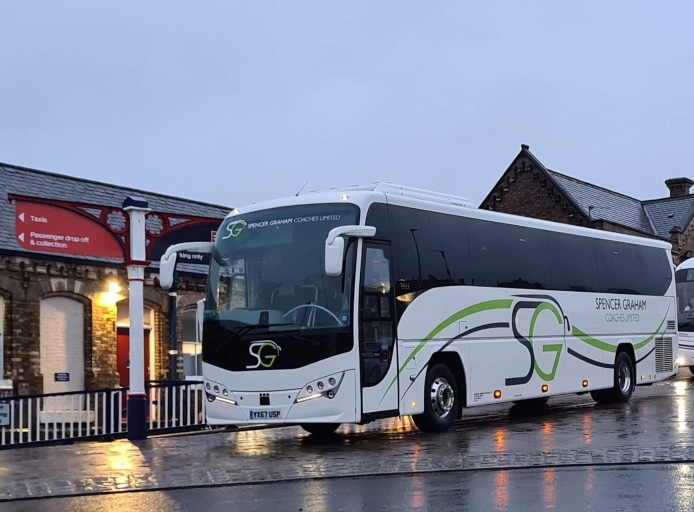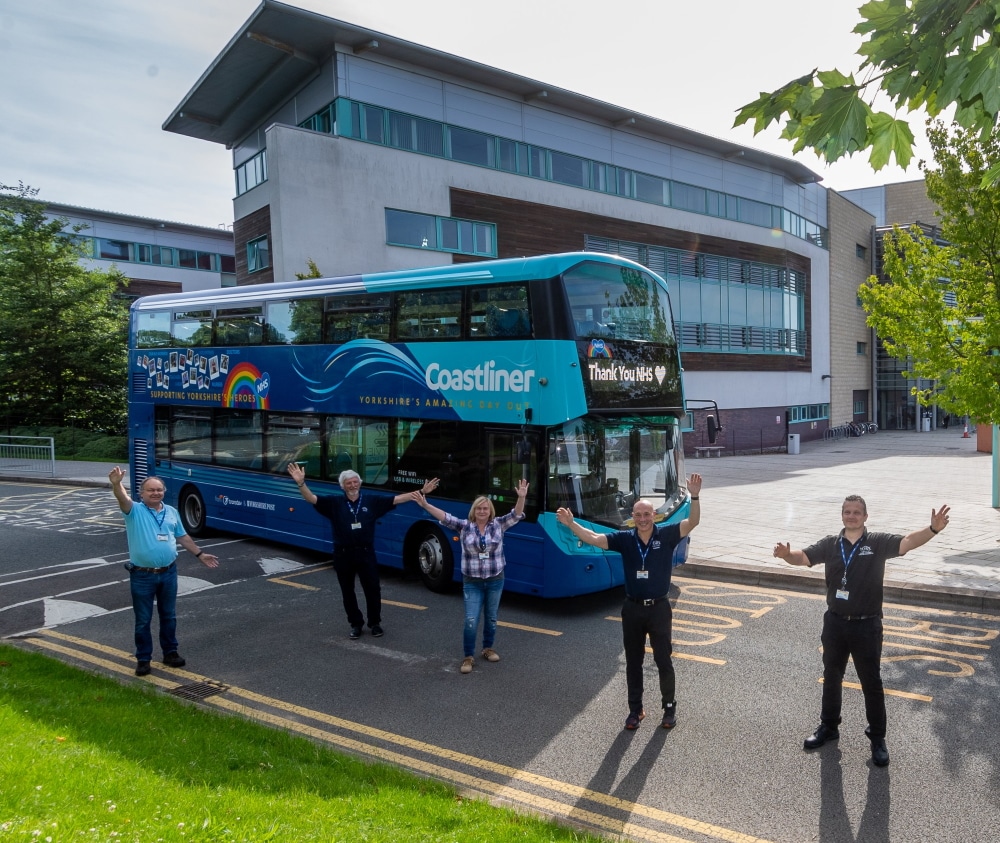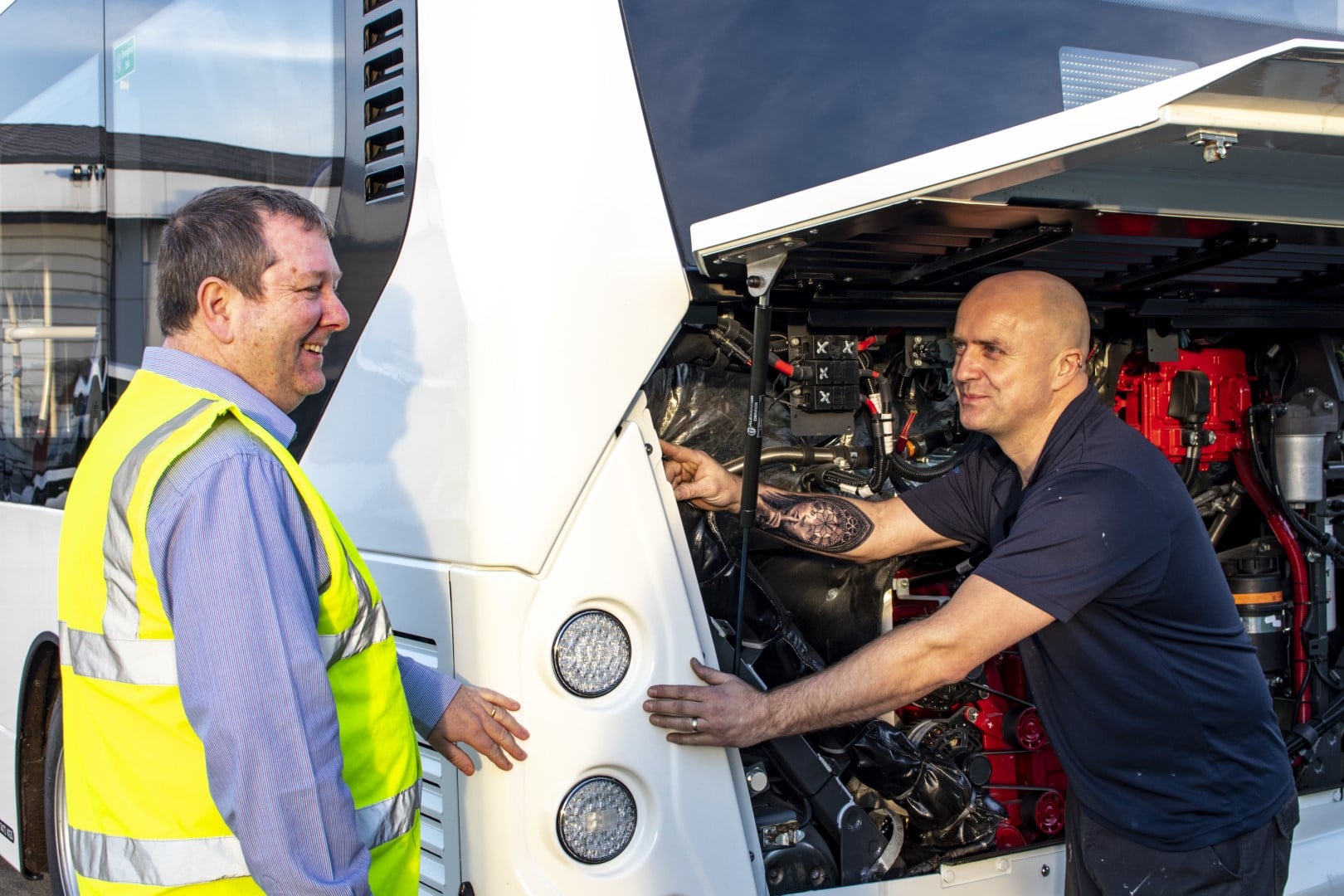What will be the positive legacy left by COVID-19 on your business? Despite its negative impact, there is evidence to suggest the pandemic has led to some welcome changes across the coaching industry, and leaves it with valuable lessons for the future
It can be difficult to look at a crisis such as coronavirus COVID-19 and seek its positive impact. But UK coach operators have proved that it exists.
As routeone learns, operational changes, lessons in investment and moral obligations towards passengers and staff show that flexibility in a crisis can offer long-term benefits.
We spoke to James Horseman of Horseman Coaches and Ricky Robinson of Spencer Graham Coaches to learn what positive changes the virus has brought to their businesses.
Ahead of the curve
Horseman Coaches was one of the first operators to receive national coverage at the beginning of the pandemic. On 31 January, 83 Britons evacuated from Wuhan were successfully repatriated from RAF Brize Norton.
Director James Horseman still recalls the public criticism during that event, despite the operator following all advice given from Public Health England (PHE). But with repeat business making up the majority of its work, positive letters and emails from Horseman’s regular clients came in equal measure. “In fact, some work came our way as a result of the exposure,” James explains. “Eton College was upset about the way Horseman Coaches had been treated – we had been a sole supplier for around 25 years – and rallied parents and staff to find other transport work for us, to try and recover any business that had been lost.”
In the meantime, Horseman has reviewed all procedures and working practices. Weeks have been spent producing handbooks for driver, office and engineering departments to cover every aspect of their working environment. The January repatriation job and James’ early conversations with PHE gave the operator a ‘jump start’ in putting positive change into the business. “From those conversations in early February it seemed clear to me this pandemic was coming and it would reach the UK very soon. We implemented hand sanitiser stations around our depot, office and vehicles, vehicle disinfections after every passenger journey and put vehicles through a much more frequent cleaning process with new procedures on the handling of luggage, lost property and money.”
James says those procedures were put in place around six weeks before the lockdown was announced, and look set to last long into the future. “Many speak of our ‘new normal’, though as a coach operator I’m not sure I share that view. Our normal is always changing, and the coach industry has proven itself to be one of the most adaptable out there. Every aspect of our working lives is going to change, and I’m certain it is going to be a positive change.”

Managing cleanliness during COVID-19
For James, the consequences of the pandemic are likely to lead to permanent change in the way operators manage cleanliness and public safety. The new cleaning procedures, on-board hand sanitiser stations, different measures being taken to ensure passenger safety “will remain long after social distancing is gone – and will certainly last beyond the duration of the pandemic,” he believes.
Part of that is down to moral obligation, he adds. Operators have been hit hard by this event, and a heightened scrutiny by users demands, James hopes, a moral obligation to reduce the transmission of any disease. “In light of what we’ve experienced, I hope this point is seen by others. We have seen how fragile we really are, and how quickly things can change. As a result of some of the tragedies people have gone through, operators can now stand up and say, ‘I can do more, I will do more.’”

Investment proves its worth
The pandemic has also thrown up its share of ironies. While many operators have been devastated by a collapse in revenue following investment to meet Euro VI and PSVAR requirements, that investment has proven a lifeline for some.
Director of Spencer Graham Coaches Ricky Robinson has relied on rail replacement work to ‘ride the wave’ of coronavirus COVID-19. Investment in three PSVAR-compliant vehicles in November was a plunge for the young business, but has helped it survive a total collapse in revenue as two main rail providers requested PSVAR vehicles for rail replacement duties. “It’s been a major positive, and has kept our heads above the water,” Ricky explains.
Spencer Graham saw a tough transition following its victory in the transport and logistics category at the North West Family Business Awards on 6 March. Within a matter of weeks Ricky felt the businesses was about to crumble, and yet he has found himself in a reasonably stable position thanks to smart investment and quick decisions.
A series of pandemic-specific changes followed in March, all of which Ricky believes will leave a lasting and positive impression for the business. Chief among which is the impetus for staff to ‘do their part’ in meeting already high standards.
“Developing safe systems of work early on in the pandemic and having implemented clear policies and procedures for our passengers and employees, we are confident we have done all we can to reduce the risk.
“We pride ourselves on a clean fleet, but the pandemic has given us extra ammunition to get drivers and staff onboard with stricter cleaning routines,” he says.
Drivers have been issued with additional personal protective equipment (PPE) to match the newfound enthusiasm for keeping vehicles safe. Drivers will further be invited to a ‘back to work’ training day which will be centred around Spencer Graham’s coronavirus COVID-19 safe operating policies and procedures, enabling them to return to work with confidence.
Ricky says operators must be aware that passengers will be more likely to scrutinise cleaning procedures for years to come, and so echoes the sentiments of James in urging operators to realise their obligations in thorough disinfections.
Likewise, the push for additional driver involvement will, he believes, lead to an improvement in quality for other work. “Drivers are encouraged to alight, show their presence; we demonstrate the cleanliness of the vehicle on regular journeys, and the result is that the whole customer experience is improved,” he says.
The introduction of a cleaning log, bringing a paper trail to these every day processes, may well also become a permanent benefit to routine safety procedures.

Avoid complacency after COVID-19
James and Ricky both make points about the risks of complacency.
Coronavirus COVID-19 has given the coach industry a short and sharp shock, and has proven how easy it has been for the industry to grow complacent after many years’ success. A lack of government support has also compounded the problems it currently faces.
“We’ve all had a wake-up call from this pandemic,” James explains. “A lot of operators have been doing well for a long time and something like this goes to show there are things around the corner we need to be prepared for.”
This, coming from an operator which once carried on average 8-9,000 students to and from school each day, shows how vital it is to recognise the risk of transmission that such a significant volume of passenger journeys brings. “We can’t afford to be complacent,” James adds. “We must stay on top of this now, as we do not want anything else to risk the safety of our passengers.”
It is likely to be some time before the entire cost of coronavirus COVID-19 is known, if indeed it is ever fully known – and many more casualties are likely yet to come.
But if one positive legacy can be taken away from the pandemic, it is that the industry has learned now that it must be prepared for any eventuality – and constantly innovate in what it can do on a daily basis to protect its customers, staff, and future business.



























